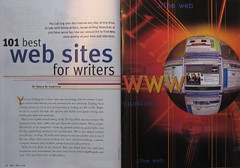I’ve done a LOT of freelance and ghost writing in my time, and I can honestly say that I have NEVER missed a deadline. Not once.
This is where your reputation as a writer comes into play. Plenty of writers may write better than I do. I’ve never claimed to be the very best writer in the Universe, though I’m guessing we all want to be that, let’s face it… we just can’t be. But when editors are asked who the very best writers are, I guarantee you that they’ll be mentioning the writers that are reliable.

- Image by yeah but via Flickr
Writers are flaky at times, no doubt about it. I mean, have you read any novel about a writer produced in the past let’s say 30 years? They’re always alcoholic and down to their last two bucks, right? I mean, come on. There is no such thing as a misunderstood genius, only writers that produce work on time and as promised and those that can’t and just flake out. But because I always made sure that my stuff was done on time, editors usually loved me and I ended up getting some plum assignments solely because they knew they could depend on me.
Writer’s Digest was like that. I started out writing their “Markets” column now and then to every month and got some very cool checks from that for very short articles. I had a good relationship with the editor and it was great. She never hesitated to throw work in my direction because I helped make her job easier.
I worked for them freelance until I started writing books and couldn’t balance the two styles. When I write a serious book, my brain has to be into that 100% and so I try to avoid distractions that might bring in more money but produce crappier work.
There were still times when the dread writer’s block would rear its ugly head on me, and it happened more often when I was on a short deadline. I’d get a call and literally have to produce an article overnight. Back then, it seemed crazy! Today, I could probably write almost any article in a couple of hours, including research. But then, it was a major project. Which goes to prove that the more you write, the faster and better your writing becomes, too.
I remember the very first huge assignment I got. I was writing for a woman’s newspaper in Pittsburgh and the assignment was to figure out what Pittsburgh would be like in the year 2000. This was back in 1994, mind you. So, I had no idea what to write. I’m not a futurist and as I recall at the time, I didn’t even know what a futurist was. Ha!
But I found out. I got some books from the library that were written by futurists. Then, I got the names of people on the Technology council, in the power companies, at the University, and I interviewed all of them. There was no “online research” for me back then. I was still working on a Compaq DeskPro in DOS with an amber monitor and a 20M hard drive. I had to research everything the hard way. So, I did.
And I still didn’t know what to write.
So, I started cataloging my research. This was about X and it came from author Y. And eventually, I had a puzzle to put together, which became this great article that even got the double truck. (That’s newspaper for the center two pages that spread all the way across.) I was ecstatic! I had no idea what I was going to write when I started, but just gathering what I could find in terms of research and then piecing it all together gave me a dynamite article. I’m still proud of that one to this day.
If you’re writing non-fiction, this is definitely the way to go.
But fiction can be similar. Remember that if you’re writing fiction, it has to be real so that your readers will believe the story. So, start researching your settings, write a dossier on your characters, talk to people and LISTEN to people. I once wrote a whole short story from a conversation I overheard while sitting in McDonald’s drinking a cup of coffee. McDonald’s food might suck, but it’s a great place to find fiction fodder.
The idea here is to jump out of yourself when you’re blocked. Start relying on outside resources to make your puzzle clearer. You’ll see. It works for me every time, and I’ll bet it will work for you.

